
python-weekly
A free weekly newsletter featuring noteworthy articles, tutorials, open-source projects, podcasts, videos, trending topics, and more.Python 潮流周刊,分享文章、教程、开源项目、软件工具、播客和视频、热门话题等内容。
Stars: 1809
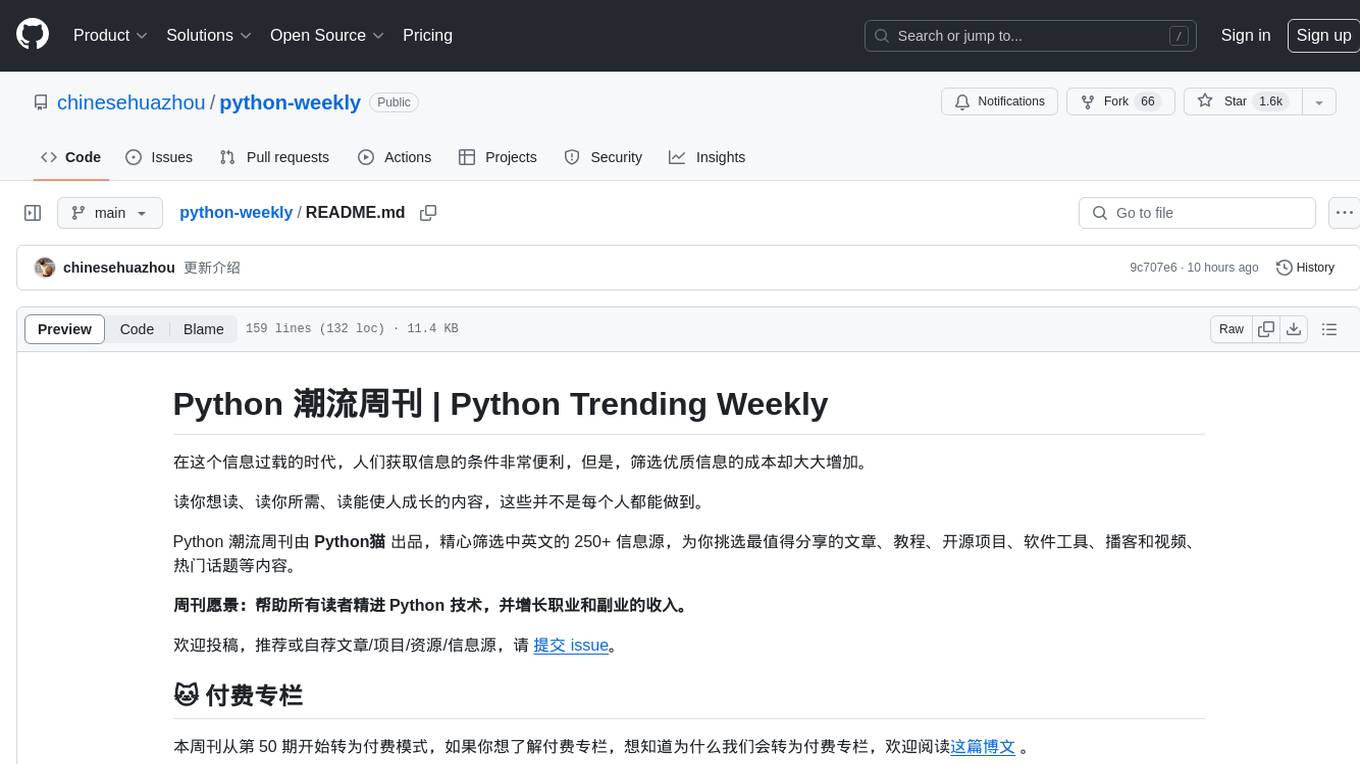
Python Trending Weekly is a curated newsletter by Python猫 that selects the most valuable articles, tutorials, open-source projects, software tools, podcasts, videos, and hot topics from over 250 English and Chinese sources. The newsletter aims to help readers improve their Python skills and increase their income from both professional and side projects. It offers paid subscription options and is available on various platforms like GitHub, WeChat, blogs, email, Telegram, and Twitter. Each issue shares a collection of articles, open-source projects, videos, and books related to Python and technology.
README:
Good news! We've launched our brand new official website. Welcome to visit: https://weekly.pythoncat.top
In this age of information overload, while access to information has become incredibly convenient, the cost of filtering quality content has significantly increased.
Reading what you want, what you need, and what helps you grow - these are not abilities everyone possesses.
Python Trending Weekly is produced by Python Cat, carefully curating over 400+ Chinese and English information sources to bring you the most valuable articles, tutorials, open-source projects, software tools, podcasts, videos, and trending topics.
Our vision: Help all readers improve their Python skills and increase their career and side income.
Contributions are welcome! To recommend articles, projects, resources, or information sources (including your own), please submit an issue.
Handpicked from 400+ premium sources across Chinese and English ecosystems, spanning official documentation, technical blogs, open-source communities, and academic publications to deliver cutting-edge, authoritative insights.
From in-depth technical articles and open-source projects to multimedia resources, trending topics, and technical books—everything you need for diverse learning experiences.
Each issue features 12 carefully selected technical articles plus 12 open-source projects, enhanced with multimedia resources and trending discussions for a complete tech ecosystem.
AI technology efficiently aggregates massive information streams, while human editors apply rigorous standards to ensure every recommendation delivers genuine learning value.
Every piece includes thoughtfully crafted summaries and editorial insights—not just raw content reposts—plus relevant supplementary materials for deeper understanding.
Beautifully designed layouts with compelling visuals, plus special highlighting for 1000+ star open-source projects to help you quickly identify top-tier resources.
Starting from issue #47, this weekly newsletter has transitioned to a paid model. If you'd like to learn more about our paid subscription and why we made this change, please read this blog post.
We currently offer one subscription option:
- Patreon (Recommended for English readers)
As we publish more issues, we'll gradually make earlier content freely available (issue n+50 will be free). Stay tuned!
| 📈 Statistics | 📊 Count |
|---|---|
| 📅 Total Issues | 118 |
| 📝 Total Articles | 1432 |
| 🚀 Total Projects | 1355 |
| 🎵 Total Audio/Video | 125 |
| 🔥 Total Hot Topics | 53 |
| 📚 Total Books | 98 |
- Issue 118: Python 异步为何不够流行?
- 分享了 12 篇文章,12 个开源项目
- Issue 117: A Documentary on Python's Origin Story
- Shared 12 articles, 12 open-source projects, 1 audio/videos
- Issue 116: The State of Python 2025
- Shared 12 articles, 12 open-source projects
- Issue 115: Astral Launches pyx Package Registry, AI Optimizes 20-Year-Old Code
- Shared 12 articles, 12 open-source projects
- Issue 114: Python performance myths and fairy tales
- Shared 12 articles, 12 open-source projects
- Issue 113: Replacing Async/Await with Virtual Threads
- Shared 12 articles, 12 open-source projects, 1 audio/videos
- Issue 112: Welcoming the New Generation of AI-Era Programmers
- Shared 13 articles, 12 open-source projects
- Issue 111: Django Celebrates 20th Anniversary, Former OpenAI Employee Shares Work Experience
- Shared 13 articles, 13 open-source projects, 1 audio/videos
- Issue 110: JIT Compiler Two-Year Retrospective, AI Agent Tools Explosion
- Shared 12 articles, 12 open-source projects
- Issue 109: Python Performance Optimization Tips
- Shared 13 articles, 13 open-source projects
- Issue 108: Will AI Replace Junior Developers?
- Shared 12 articles, 12 open-source projects, 2 audio/videos
- Issue 107: GIL-Free Python Gets Official Approval
- Shared 12 articles, 12 open-source projects, 2 audio/videos, 2 hot discussions
- Issue 106: PEP 734 officially accepted, the era of multiple interpreters is coming
- Shared 12 articles, 15 open-source projects
- Issue 105: Best Practices for Developing React+Flask Projects in 2025
- Shared 12 articles, 12 open-source projects
- Issue 104: Python Considering Adding Virtual Threads?
- Shared 12 articles, 12 open-source projects, 2 audio/videos, 2 hot discussions
- Issue 103: LlamaIndex's Monorepo Transformation
- Shared 12 articles, 13 open-source projects, 2 audio/videos
- Issue 102: Microsoft Lays Off Faster CPython Team
- Shared 12 articles, 12 open-source projects, 2 audio/videos, 3 hot topics
- Issue 101: Rust-Developed Python Type Checking Tool
- Shared 12 articles, 12 open-source projects
- Issue 100: With f-strings, Why Do We Need t-strings?
- Shared 12 articles, 12 open-source projects, 1 audio/video
- Issue 99: How to Run Python in Production?
- Shared 12 articles, 12 open-source projects, 2 audio/videos, 2 hot topics
- Issue 98: t-string Syntax Officially Accepted
- Shared 12 articles, 12 open-source projects, 2 audio/videos
- Issue 97: CUDA Finally Natively Supports Python!
- Shared 12 articles, 12 open-source projects, 2 hot topics
- Issue 96: What Exactly is MCP?
- Shared 12 articles, 12 open-source projects, 2 hot discussions
- Issue 95: Using Computers Like Humans
- Shared 11 articles, 12 open-source projects
- Issue 94: How to Solve FastAPI's Large File Transfer Problem?
- Shared 11 articles, 12 open-source projects, 2 audio/videos
- Issue 93: Why is "if not list" 2x Faster Than len()?
- Shared 12 articles, 12 open-source projects
- Issue 92: A Map of Python Packages
- Shared 12 articles, 12 open-source projects
- Issue 91: The Future of Python in the Browser
- Shared 12 articles, 12 open-source projects
- Season 3 Collection: Exclusive to paid readers, stay tuned for open-source release
- Issue 90: uv Turns One Year Old: Pros and Cons Analysis
- Shared 12 articles, 12 open-source projects
- Issue 89: Python 3.14's New Interpreter!
- Shared 12 articles, 12 open-source projects, 2 hot discussions
- Issue 88: What Was Python's First Stable Version Like?
- Shared 12 articles, 12 open-source projects, 1 hot discussion
- Issue 87: Open-Source Models Comparable to OpenAI-o1
- Shared 12 articles, 12 open-source projects
- Issue 86: Jupyter Notebook Intelligent Coding Assistant
- Shared 12 articles, 12 open-source projects
- Issue 85: Let AI Help You Write Better Code
- Shared 12 articles, 12 open-source projects, 1 audio/video
- Issue 84: Python Best Practices for 2024
- Shared 12 articles, 12 open-source projects
- Issue 83: Tips for Using uv
- Shared 12 articles, 12 open-source projects, 2 hot discussions
- Issue 82: How Does the CIA Use Python?
- Shared 12 articles, 12 open-source projects
- Issue 81: Running GPT-4 Level LLMs on Personal Computers
- Shared 12 articles, 12 open-source projects, 2 audio/videos
- Issue 80: Django Project Performance Optimization
- Shared 12 articles, 12 open-source projects, 3 audio/videos
- Issue 79: Python's Metadata Dilemma
- Shared 12 articles, 12 open-source projects, 2 hot discussions
- Issue 78: async/await is a Poor Design
- Shared 12 articles, 12 open-source projects, 1 audio/video
- Issue 77: Is Python Dependency Management Like a Landfill Fire?
- Shared 12 articles, 12 open-source projects, 2 hot discussions
- Issue 76: Implementing BASIC in 50 Lines of Python Code
- Shared 11 articles, 12 open-source projects
- Issue 75: Developing a NoSQL Database with Python
- Shared 11 articles, 12 open-source projects, 1 audio/video, 2 hot discussions
- Issue 74: Python Programming Class Sets Guinness World Record
- Shared 12 articles, 12 open-source projects, 2 audio/videos
- Issue 73: Let's Be Gentle with PyPI, Shall We?
- Shared 12 articles, 12 open-source projects, 2 hot discussions
- Issue 72: Python 3.13.0 Final Version Released!
- Shared 14 articles, 12 open-source projects, 4 audio/videos
- Issue 71: PyPI Should Break Free from Sponsorship Dependency
- Shared 12 articles, 12 open-source projects, 1 audio/video
- Issue 70: Python in Microsoft Excel Officially Released!
- Shared 12 articles, 12 open-source projects, 2 audio/videos
- Issue 69: It's Time to Stop Using Python 3.8
- Shared 12 articles, 12 open-source projects
- Issue 68: 2023 Python Developer Survey Results
- Shared 12 articles, 12 open-source projects, 2 hot discussions
- Issue 67: Major Updates to uv
- Shared 12 articles, 12 open-source projects
- Issue 66: Python's Preprocessor
- Shared 12 articles, 12 open-source projects, 1 audio/video
- Issue 65: CSV is a Bit Problematic
- Shared 12 articles, 12 open-source projects
- Issue 64: Are Python Function Calls Still Slow?
- Shared 11 articles, 13 open-source projects, 1 audio/video
- Issue 63: Developing Python Web Projects
- Shared 10 articles, 13 open-source projects, 2 hot topics
- Issue 62: Trying Free-Threaded Python
- Shared 12 articles, 12 open-source projects
- Issue 61: PyPI Administrator Key Leak Incident
- Shared 12 articles, 12 open-source projects, 2 audio/videos, 2 hot topics
-
Season 2 Collection
- Highlights from issues 31-60
- Issue 60: Python Has So Many Package Management Tools
- Shared 13 articles, 13 open-source projects
- Issue 59: Polars 1.0 Released, PyCon US 2024 Talk Videos Also Released
- Shared 12 articles, 12 open-source projects, 2 videos, 5 books given away
- Issue 58: The Fastest Language for Running Prototypes
- Shared 12 articles, 12 open-source projects, 5 books given away
- Issue 57: Should Python Adopt Calendar Versioning?
- Shared 12 articles, 12 open-source projects, 5 books given away
- Issue 56: Faster String Functions in NumPy 2.0
- Shared 12 articles, 12 open-source projects, 5 books given away
- Issue 55: Sharing 9 High-Quality Technical Information Sources!
- Special extra issue, sharing several high-quality newsletter-type information sources
- Issue 54: ChatTTS: Powerful Text-to-Speech Model
- Shared 12 articles, 12 open-source projects, 3 audio/videos
- Issue 53: Role Models: One Meeting a Nobel Laureate, One Becoming a Core Developer
- Shared 12 articles, 12 open-source projects, 5 books given away: "How Programs Run (3rd Edition)"
- Issue 52: Python Resources for Handling Excel
- Shared 12 articles, 12 open-source projects, 5 books given away: "How the Network is Connected"
- Issue 51: Creating Beautiful Charts with Python
- Shared 12 articles, 12 open-source projects, 5 books given away: "Illustrated IT Infrastructure"
- Issue 50: My Favorite Python 3.13 New Features!
- Shared 12 articles, 11 open-source projects, 2 audio/videos, 5 books given away: "Hackers and Painters (100,000 Copy Anniversary Edition)"
- Issue 49: Google Lays Off Python Team, Microsoft Open-Sources MS-DOS 4.0
- Shared 12 articles, 12 open-source projects, 2 videos, 5 books given away: "Hello Algorithm"
- Issue 48: Python 3.14 Release Plan
- Shared 12 articles, 11 open-source projects, 5 books given away: "Illustrated TCP/IP (6th Edition)"
- Issue 47: When Your Teacher Wants You to Do Open Source
- Shared 12 articles, 12 open-source projects, 2 audio/videos, 5 books given away: "Python Crash Course (3rd Edition)"
- Issue 46: How to Use Python to Predict Solar Eclipse Times and Paths?
- Shared 13 articles, 12 open-source projects, 2 audio/videos, 7 books given away: "Python Tutorial (3rd Edition, Revised)"
- Issue 45: More and More AI Automatic Development Frameworks
- Shared 13 articles, 11 open-source projects, 2 audio/videos, 5 books given away: "Python and Its Applications (2nd Edition)"
- Issue 44: Mojo Open-Sourced This Week; AI Learns to Generate Music
- Shared 12 articles, 13 open-source projects, 5 books given away: "Clear Python Algorithms and Data Structures"
- Issue 43: Between Open Source and Family, He Chose Family
- Shared 12 articles, 12 open-source projects, 2 audio/videos, 5 books given away: "Python Data Structures and Algorithm Analysis (3rd Edition)"
- Issue 42: What Can Small Companies Achieve with Python Development?
- Shared 12 articles, 12 open-source projects, 6 books given away: "Fluent Python"
- Issue 41: Writing Code is Simple, But Writing Good Code is Hard
- Shared 12 articles, 12 open-source projects, 5 books given away: "Python Craftsman"
- Issue 40: White House Recommends Memory-Safe Languages Like Python
- Shared 12 articles, 11 open-source projects
- Issue 39: Ultra-Fast Packaging Tool Developed in Rust
- Shared 13 articles, 13 open-source projects, 2 podcasts
- Issue 38: Building Full-Stack Projects with Django + Next.js
- Shared 12 articles, 12 open-source projects, 5 books given away: "AI Drawing in Practice: Midjourney from Beginner to Expert"
- Issue 37: Python's "Disappointing" Dynamic Typing Superpower
- Shared 12 articles, 12 open-source projects
- Issue 36: Python Packaging Ecosystem Still Not Optimistic
- Shared 11 articles, 12 open-source projects
- Issue 35: Python JIT Compiler and Numpy2 Coming Soon
- Shared 12 articles, 12 open-source projects, 2 hot discussions
- Issue 34: Python 3.13's JIT Solution is Both New and Good!
- Shared 13 articles, 13 open-source projects, 2 audio/videos
- Issue 33: FastAPI is Good, Flask Isn't Dead, Both Have a Future
- Shared 15 articles, 13 open-source projects, 1 video
- Issue 32: Building a Personal News Aggregator
- Shared 10 articles, 10 open-source projects, 3 audio/videos
- Issue 31: After iOS, New PEP Proposes Adding Android as an Officially Supported Platform
- Shared 13 articles, 12 open-source projects, 3 audio/videos
-
Season 1 Collection
- Highlights from issues 1-30, totaling 62K words
- Issue 30: An Open Letter from the African Python Community to PSF
- Shared 12 articles, 12 open-source projects
- Issue 29: Can Rust Be Slower Than Python?!
- Shared 12 articles, 12 open-source projects, 2 podcasts, 2 hot discussions
- Issue 28: Two Types of Thread Pools, Four Methods to Optimize Programs
- Shared 12 articles, 12 open-source projects
- Issue 27: How Should We Handle Program Errors?
- Shared 12 articles, 12 open-source projects, 2 videos
- Issue 26: The Current State of requests3
- Shared 12 articles, 12 open-source projects, 3 audio/videos
- Issue 25: Ruff: The Fastest Code Formatting Tool!
- Shared 12 articles, 12 open-source projects
- Issue 24: no-GIL Proposal Officially Adopted!
- Shared 12 articles, 12 open-source projects, 3 audio/videos
- Issue 23: 35 Easy-to-Start Python Mini Projects
- Shared 12 articles, 12 open-source projects, 2 audio/videos
- Issue 22: Python 3.12.0 Released!
- Shared 12 articles, 12 open-source projects, 2 videos
- Issue 21: How to Improve and Measure Python Code Performance?
- Shared 12 articles, 10 open-source projects, 2 audio/videos
- Issue 20: Three Benchmarking Methods, Why Does Code Run Faster in Functions?
- Shared 14 articles, 10 open-source projects
- Issue 19: Mojo Finally Available for Download!
- Shared 12 articles, 8 open-source projects
- Issue 18: Tutorials for Flask, Streamlit, and Polars
- Shared 12 articles, 10 open-source projects
- Issue 17: Excel Finally Supports Python, Meta Open-Sources Major New Project, Mojo Gets $100M New Funding
- Shared 16 articles, 13 open-source projects, 3 videos, 2 hot topics
- Issue 16: Does Elegance Matter? How to Write Pythonic Code?
- Shared 16 articles, 12 open-source projects, 2 videos
- Issue 15: How to Analyze Asynchronous Task Performance?
- Shared 15 articles, 9 open-source projects, 4 podcasts
- Issue 14: Lpython High-Performance Compiler, Python and JavaScript Interoperability
- Shared 15 articles, 12 open-source projects, 1 podcast
- Issue 13: Jupyter Notebook 7 Released, Great News for the No-GIL Proposal!
- Shared 15 articles, 12 open-source projects, 1 hot topic
- Issue 12: How to Debug Deadlock Issues in Python?
- Shared 14 articles, 10 open-source projects, 5 audio/videos
- Issue 11: How to Run Python Code with Golang?
- Shared 15 articles, 12 open-source projects, 2 podcasts, 2 hot topics
- Issue 10: Twitter's Rival Threads is Developed in Python!
- Shared 13 articles, 12 open-source projects, 2 hot questions
- Issue 9: How to Deploy Open-Source Large Language Models Locally?
- Shared 15 articles, 10 open-source projects
- Issue 8: Python 3.13 Plans to Speed Up the Interpreter by 50%!
- Mentioned 12 articles, 8 open-source projects/resources, 2 hot topics
- Issue 7: I Hate Using asyncio
- Mentioned 15 articles/tutorials, 11 open-source projects/resources, 3 audio/video contents. 5 books given away
- Issue 6: Python 3.12 Has My Contributed Code!
- Mentioned 15 articles/tutorials, 11 open-source projects/resources, 3 audio/video contents
- Issue 5: How Much Memory Does It Take to Concurrently Run a Million Tasks?
- Mentioned 12 articles/tutorials, 9 open-source projects/resources, 6 audio/video contents
- Issue 4: Python 2023 Language Summit
- Mentioned 8 articles
- Issue 3: PyPI's Security Issues
- Mentioned 12 articles/tutorials, 8 open-source projects/resources, 2 videos, 2 hot discussions
- Issue 2: Rust Makes Python Great Again
- Mentioned 10 articles/tutorials, 5 open-source projects/resources, 4 audio/videos, 3 hot discussions
- Issue 1: How to Systematically Learn Python?
- Mentioned 8 articles/tutorials, 4 open-source projects, 4 audio/videos, 3 hot discussions
License: Attribution-NonCommercial-ShareAlike (CC BY-NC-SA 4.0)
For Tasks:
Click tags to check more tools for each tasksFor Jobs:
Alternative AI tools for python-weekly
Similar Open Source Tools

python-weekly
Python Trending Weekly is a curated newsletter by Python猫 that selects the most valuable articles, tutorials, open-source projects, software tools, podcasts, videos, and hot topics from over 250 English and Chinese sources. The newsletter aims to help readers improve their Python skills and increase their income from both professional and side projects. It offers paid subscription options and is available on various platforms like GitHub, WeChat, blogs, email, Telegram, and Twitter. Each issue shares a collection of articles, open-source projects, videos, and books related to Python and technology.

auto-news
Auto-News is an automatic news aggregator tool that utilizes Large Language Models (LLM) to pull information from various sources such as Tweets, RSS feeds, YouTube videos, web articles, Reddit, and journal notes. The tool aims to help users efficiently read and filter content based on personal interests, providing a unified reading experience and organizing information effectively. It features feed aggregation with summarization, transcript generation for videos and articles, noise reduction, task organization, and deep dive topic exploration. The tool supports multiple LLM backends, offers weekly top-k aggregations, and can be deployed on Linux/MacOS using docker-compose or Kubernetes.
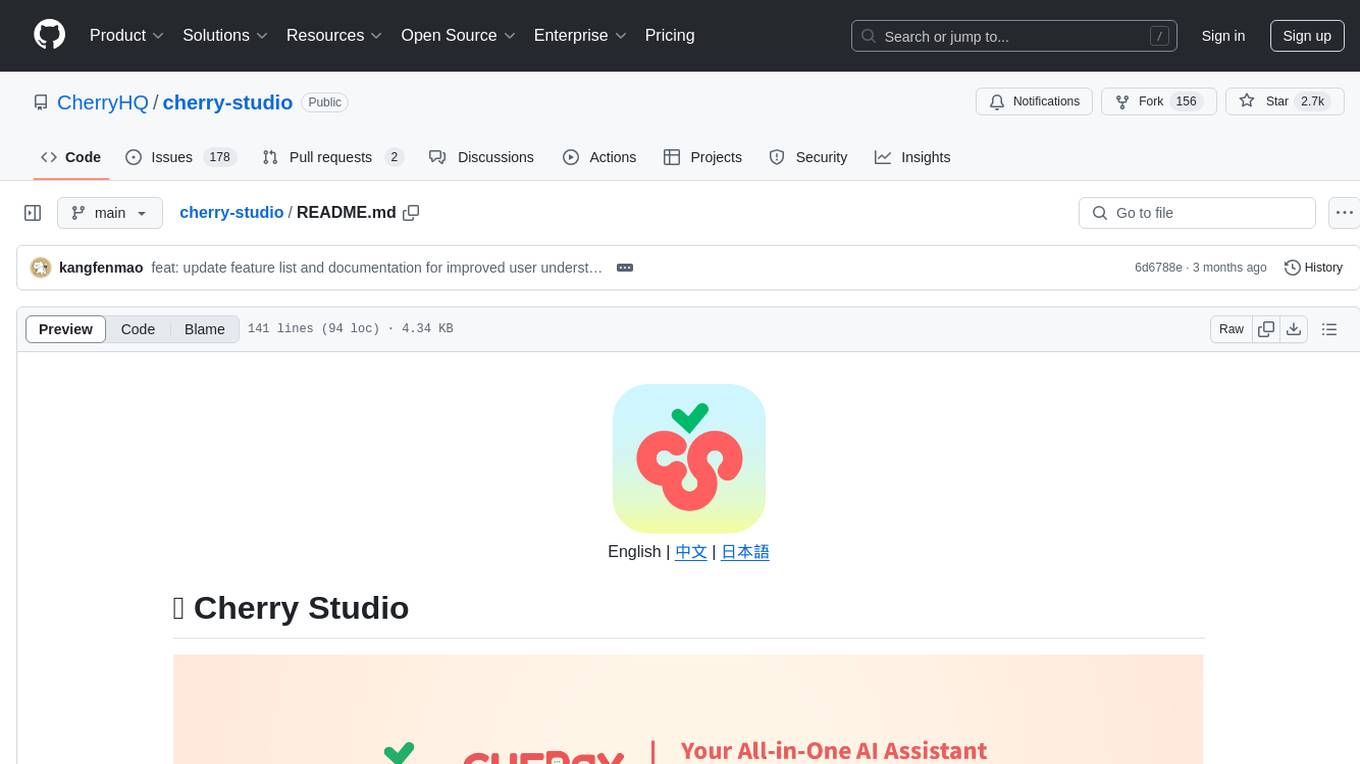
cherry-studio
Cherry Studio is a desktop client that supports multiple LLM providers on Windows, Mac, and Linux. It offers diverse LLM provider support, AI assistants & conversations, document & data processing, practical tools integration, and enhanced user experience. The tool includes features like support for major LLM cloud services, AI web service integration, local model support, pre-configured AI assistants, document processing for text, images, and more, global search functionality, topic management system, AI-powered translation, and cross-platform support with ready-to-use features and themes for a better user experience.
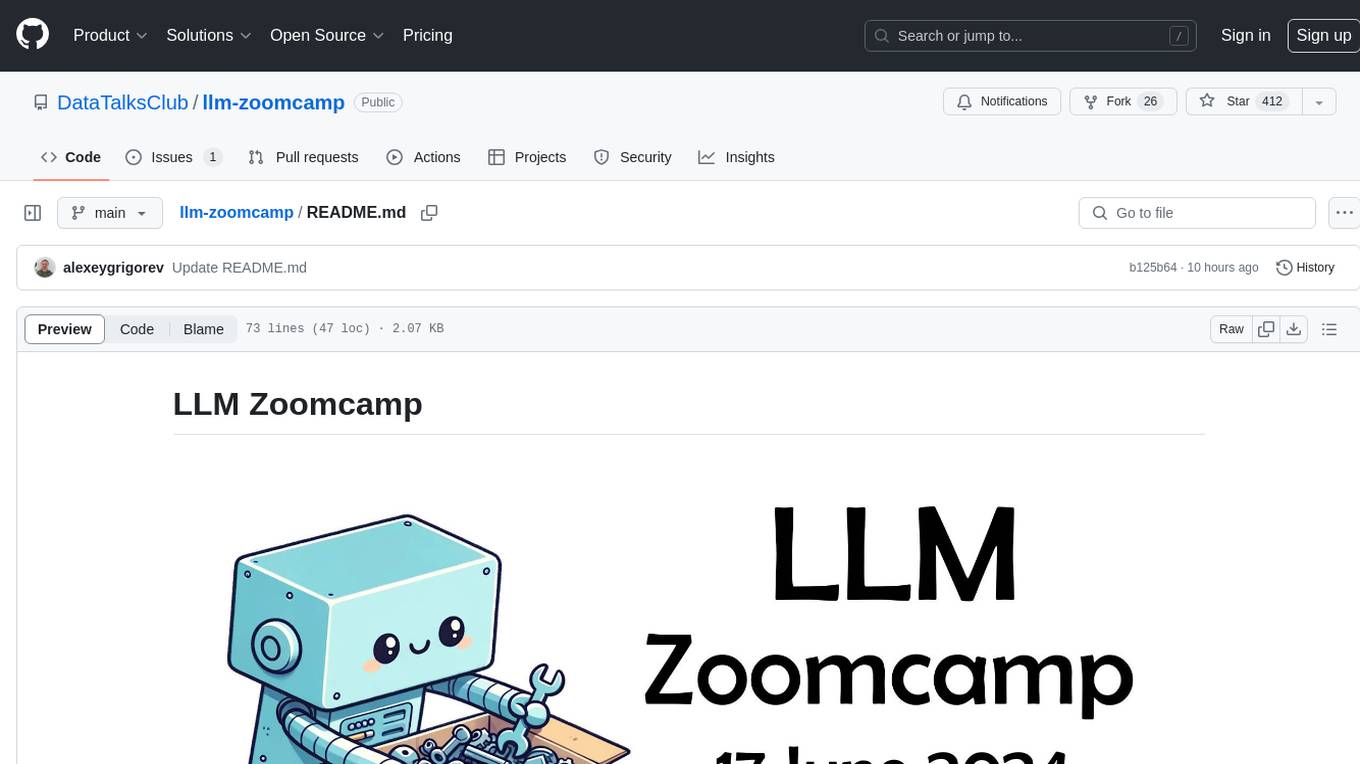
llm-zoomcamp
LLM Zoomcamp is a free online course focusing on real-life applications of Large Language Models (LLMs). Over 10 weeks, participants will learn to build an AI bot capable of answering questions based on a knowledge base. The course covers topics such as LLMs, RAG, open-source LLMs, vector databases, orchestration, monitoring, and advanced RAG systems. Pre-requisites include comfort with programming, Python, and the command line, with no prior exposure to AI or ML required. The course features a pre-course workshop and is led by instructors Alexey Grigorev and Magdalena Kuhn, with support from sponsors and partners.
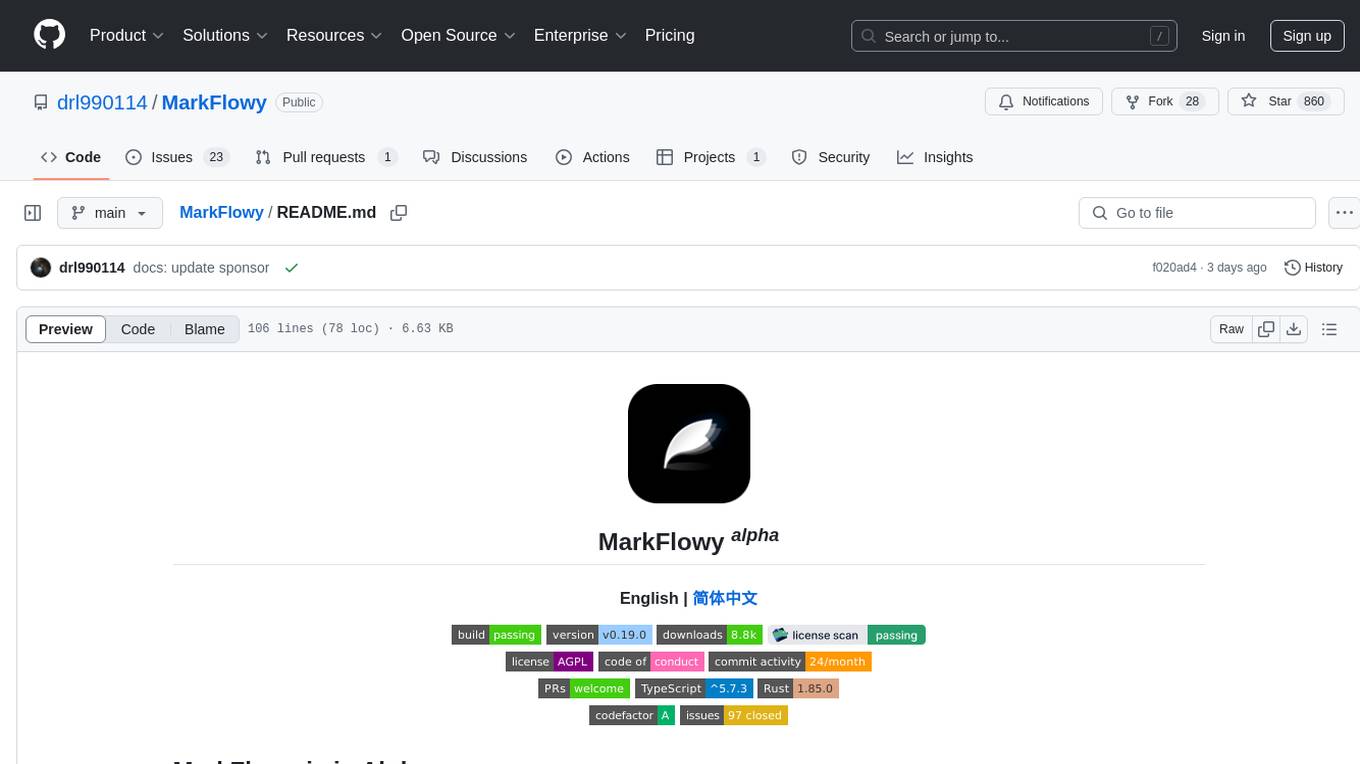
MarkFlowy
MarkFlowy is a lightweight and feature-rich Markdown editor with built-in AI capabilities. It supports one-click export of conversations, translation of articles, and obtaining article abstracts. Users can leverage large AI models like DeepSeek and Chatgpt as intelligent assistants. The editor provides high availability with multiple editing modes and custom themes. Available for Linux, macOS, and Windows, MarkFlowy aims to offer an efficient, beautiful, and data-safe Markdown editing experience for users.

SillyTavern
SillyTavern is a user interface you can install on your computer (and Android phones) that allows you to interact with text generation AIs and chat/roleplay with characters you or the community create. SillyTavern is a fork of TavernAI 1.2.8 which is under more active development and has added many major features. At this point, they can be thought of as completely independent programs.
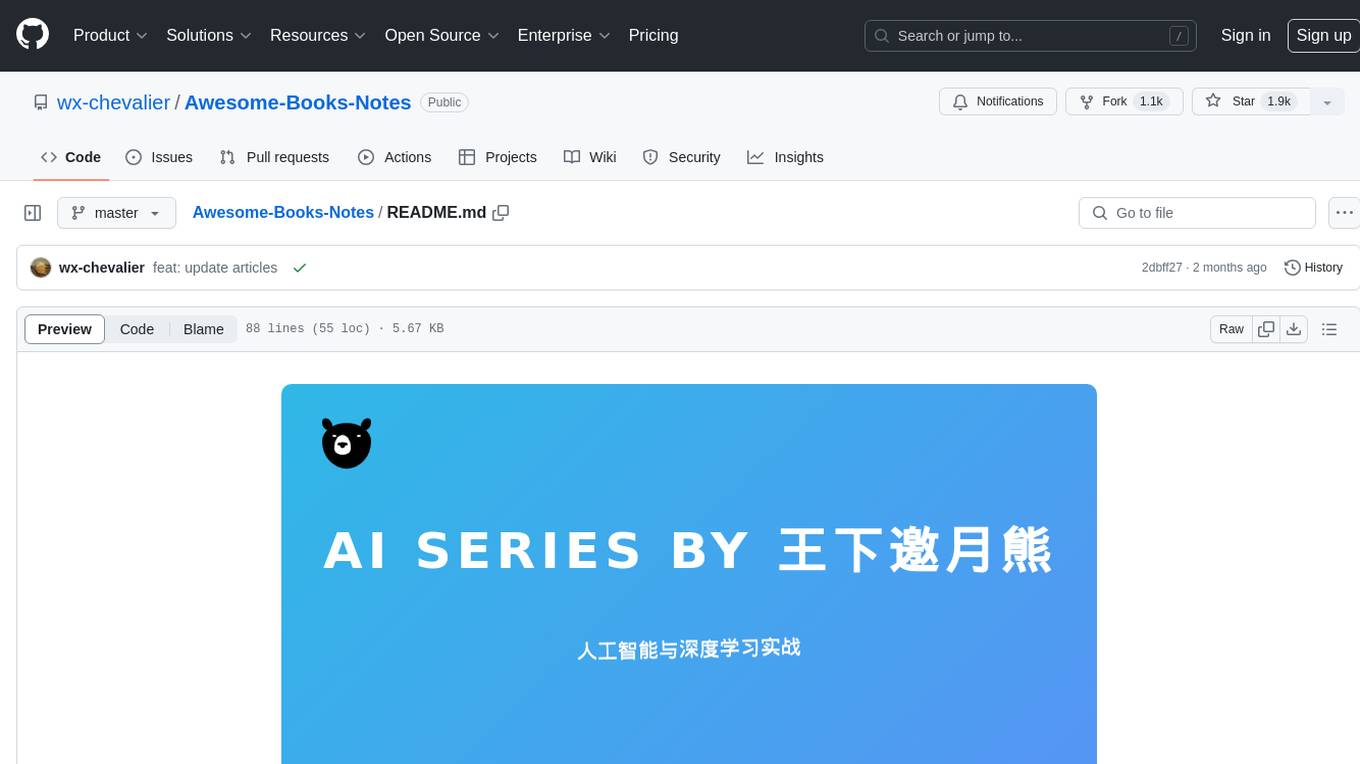
Awesome-Books-Notes
Awesome CS Books is a repository that archives excellent books related to computer science and technology, named in the format of {year}-{author}-{title}-{version}. It includes reading notes for each book, with PDF links provided at the beginning of the notes. The repository focuses on IT CS-related books, valuable open courses, and aims to provide a systematic way of learning to alleviate fragmented skills and one-sidedness. It respects the original authors by linking to official/copyright websites and emphasizes non-commercial use of the documents.
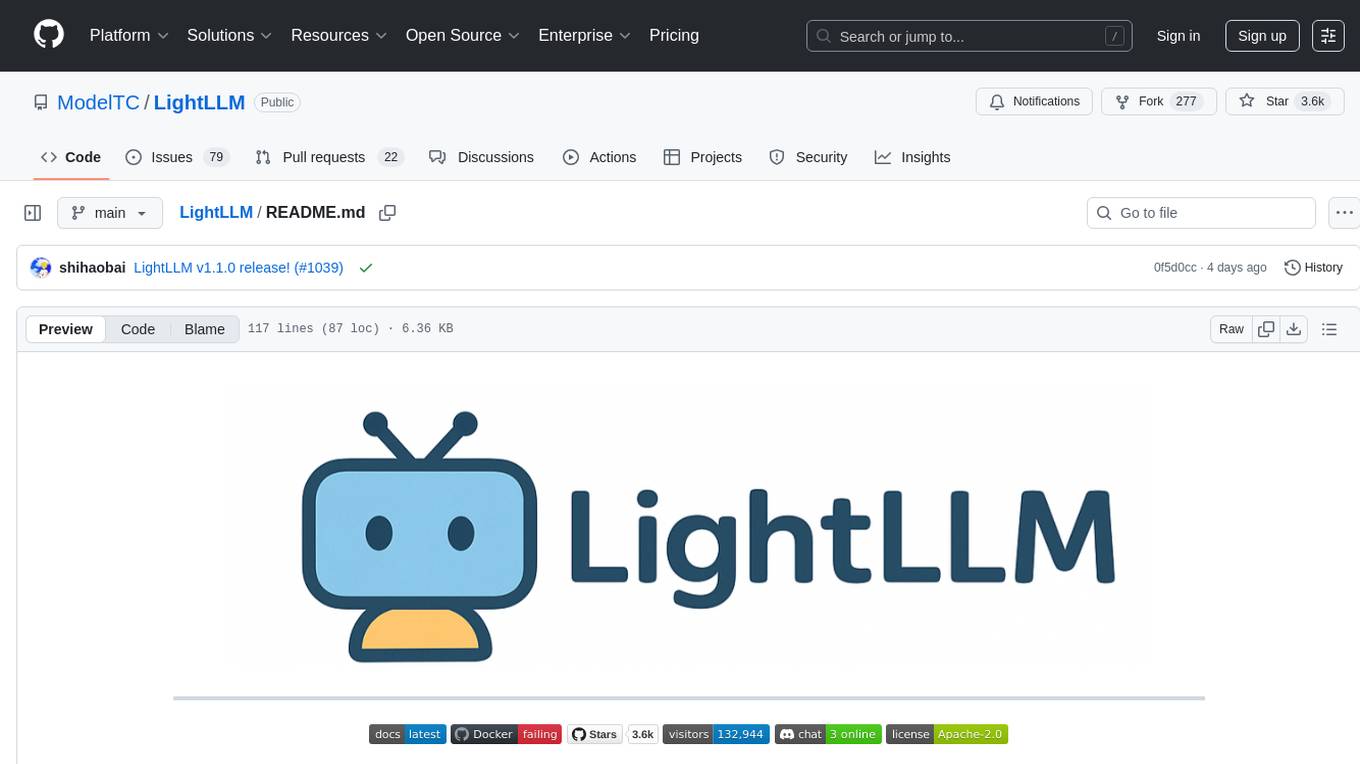
LightLLM
LightLLM is a lightweight library for linear and logistic regression models. It provides a simple and efficient way to train and deploy machine learning models for regression tasks. The library is designed to be easy to use and integrate into existing projects, making it suitable for both beginners and experienced data scientists. With LightLLM, users can quickly build and evaluate regression models using a variety of algorithms and hyperparameters. The library also supports feature engineering and model interpretation, allowing users to gain insights from their data and make informed decisions based on the model predictions.

biochatter
Generative AI models have shown tremendous usefulness in increasing accessibility and automation of a wide range of tasks. This repository contains the `biochatter` Python package, a generic backend library for the connection of biomedical applications to conversational AI. It aims to provide a common framework for deploying, testing, and evaluating diverse models and auxiliary technologies in the biomedical domain. BioChatter is part of the BioCypher ecosystem, connecting natively to BioCypher knowledge graphs.
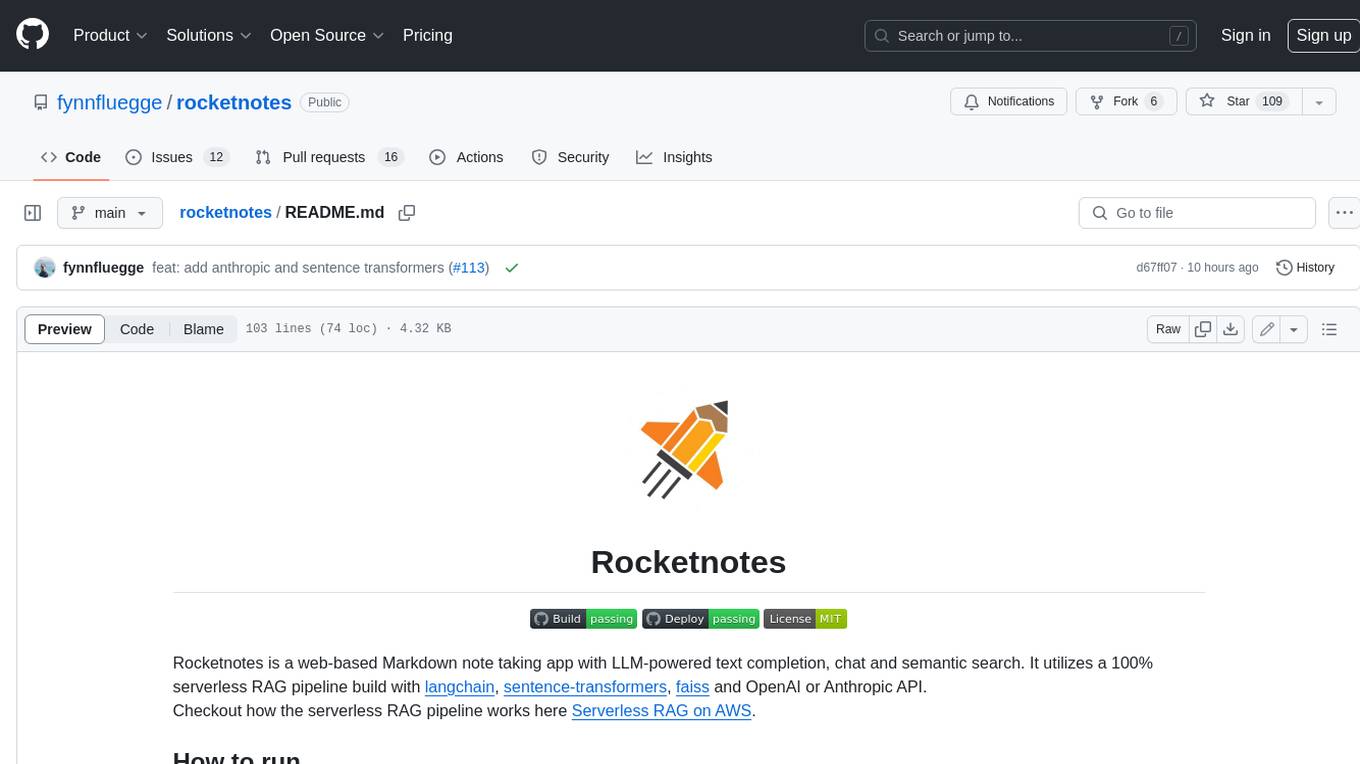
rocketnotes
Rocketnotes is a web-based Markdown note taking app with LLM-powered text completion, chat and semantic search. It utilizes a 100% serverless RAG pipeline build with langchain, sentence-transformers, faiss and OpenAI or Anthropic API.
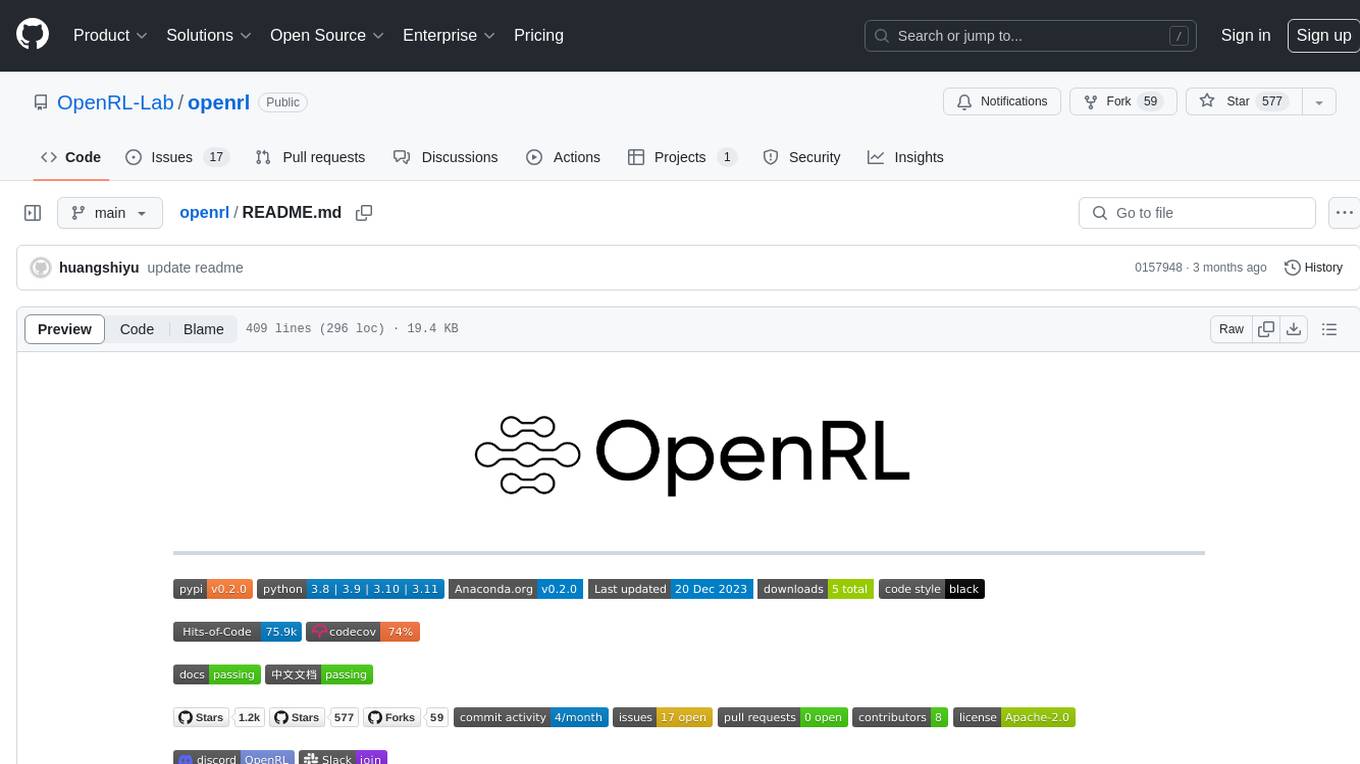
openrl
OpenRL is an open-source general reinforcement learning research framework that supports training for various tasks such as single-agent, multi-agent, offline RL, self-play, and natural language. Developed based on PyTorch, the goal of OpenRL is to provide a simple-to-use, flexible, efficient and sustainable platform for the reinforcement learning research community. It supports a universal interface for all tasks/environments, single-agent and multi-agent tasks, offline RL training with expert dataset, self-play training, reinforcement learning training for natural language tasks, DeepSpeed, Arena for evaluation, importing models and datasets from Hugging Face, user-defined environments, models, and datasets, gymnasium environments, callbacks, visualization tools, unit testing, and code coverage testing. It also supports various algorithms like PPO, DQN, SAC, and environments like Gymnasium, MuJoCo, Atari, and more.
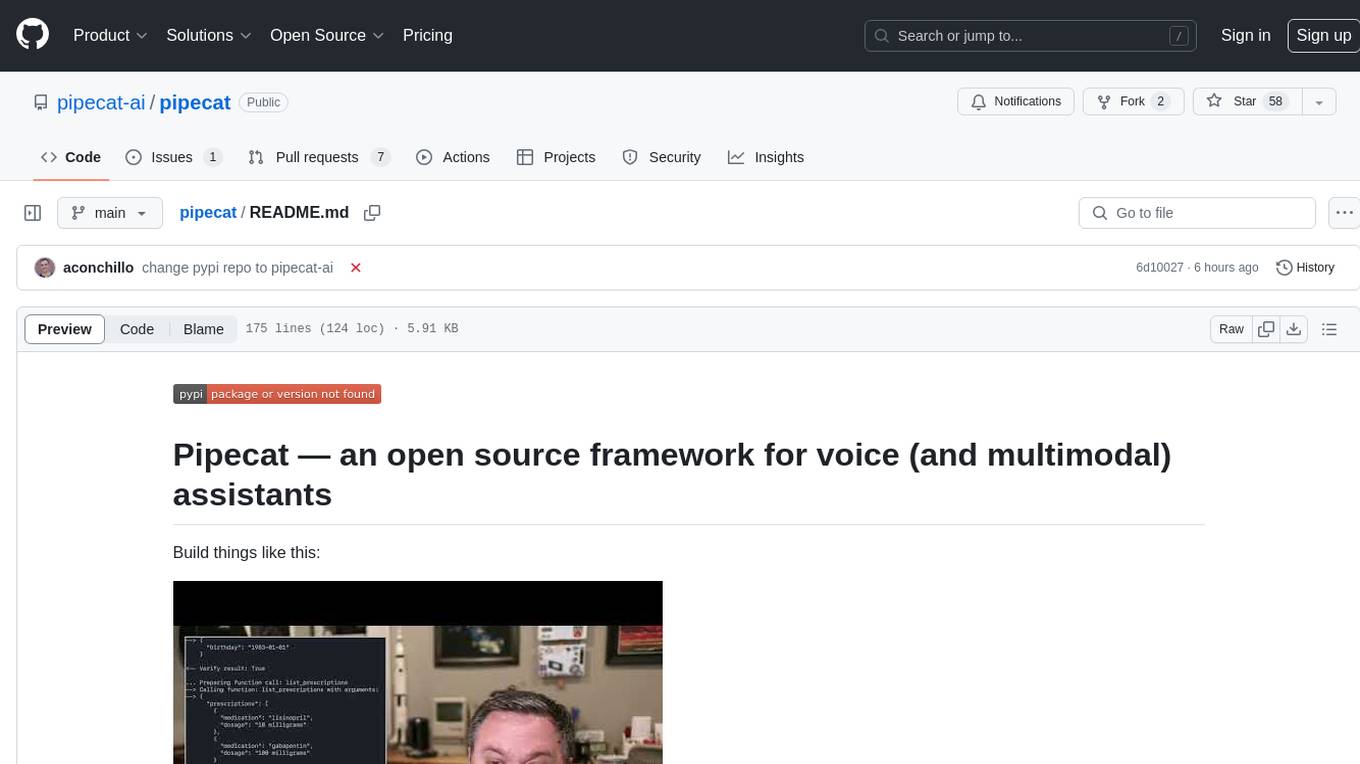
pipecat
Pipecat is an open-source framework designed for building generative AI voice bots and multimodal assistants. It provides code building blocks for interacting with AI services, creating low-latency data pipelines, and transporting audio, video, and events over the Internet. Pipecat supports various AI services like speech-to-text, text-to-speech, image generation, and vision models. Users can implement new services and contribute to the framework. Pipecat aims to simplify the development of applications like personal coaches, meeting assistants, customer support bots, and more by providing a complete framework for integrating AI services.
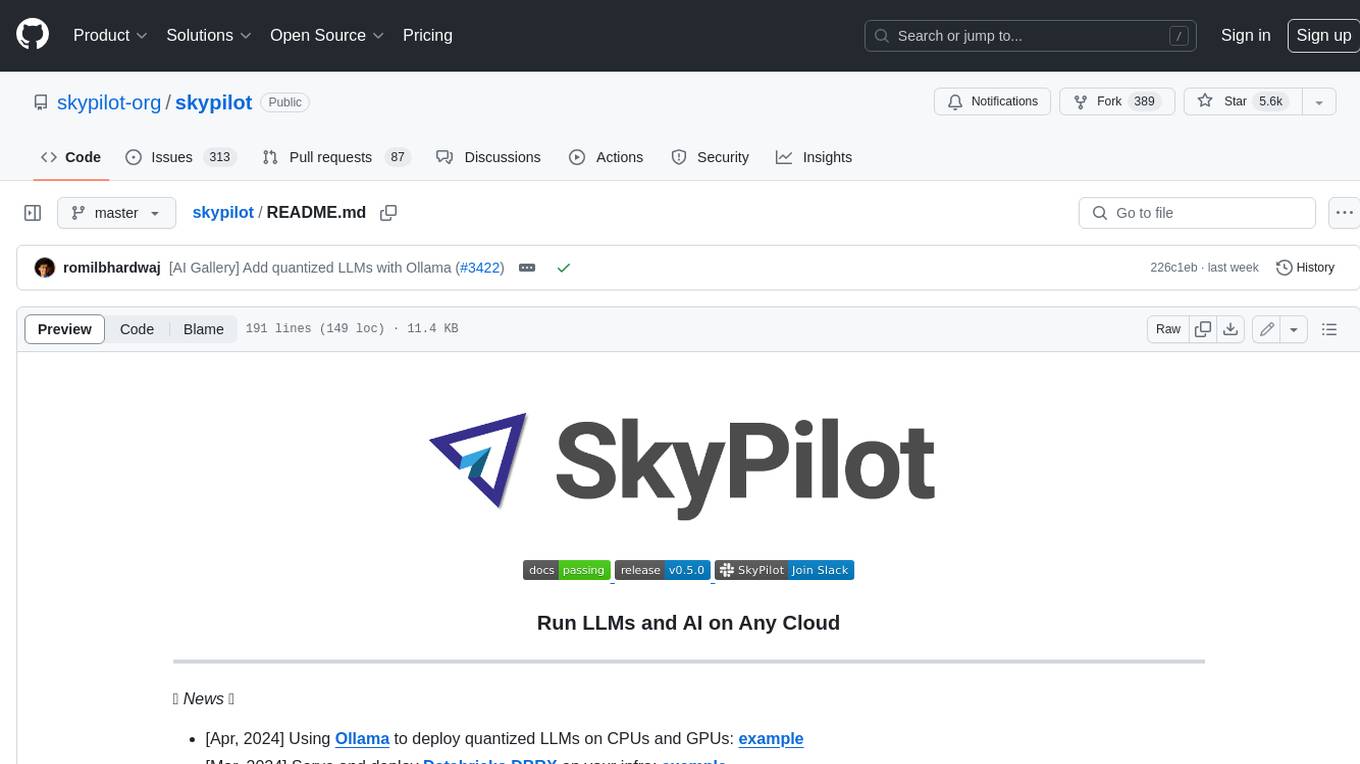
skypilot
SkyPilot is a framework for running LLMs, AI, and batch jobs on any cloud, offering maximum cost savings, highest GPU availability, and managed execution. SkyPilot abstracts away cloud infra burdens: - Launch jobs & clusters on any cloud - Easy scale-out: queue and run many jobs, automatically managed - Easy access to object stores (S3, GCS, R2) SkyPilot maximizes GPU availability for your jobs: * Provision in all zones/regions/clouds you have access to (the _Sky_), with automatic failover SkyPilot cuts your cloud costs: * Managed Spot: 3-6x cost savings using spot VMs, with auto-recovery from preemptions * Optimizer: 2x cost savings by auto-picking the cheapest VM/zone/region/cloud * Autostop: hands-free cleanup of idle clusters SkyPilot supports your existing GPU, TPU, and CPU workloads, with no code changes.
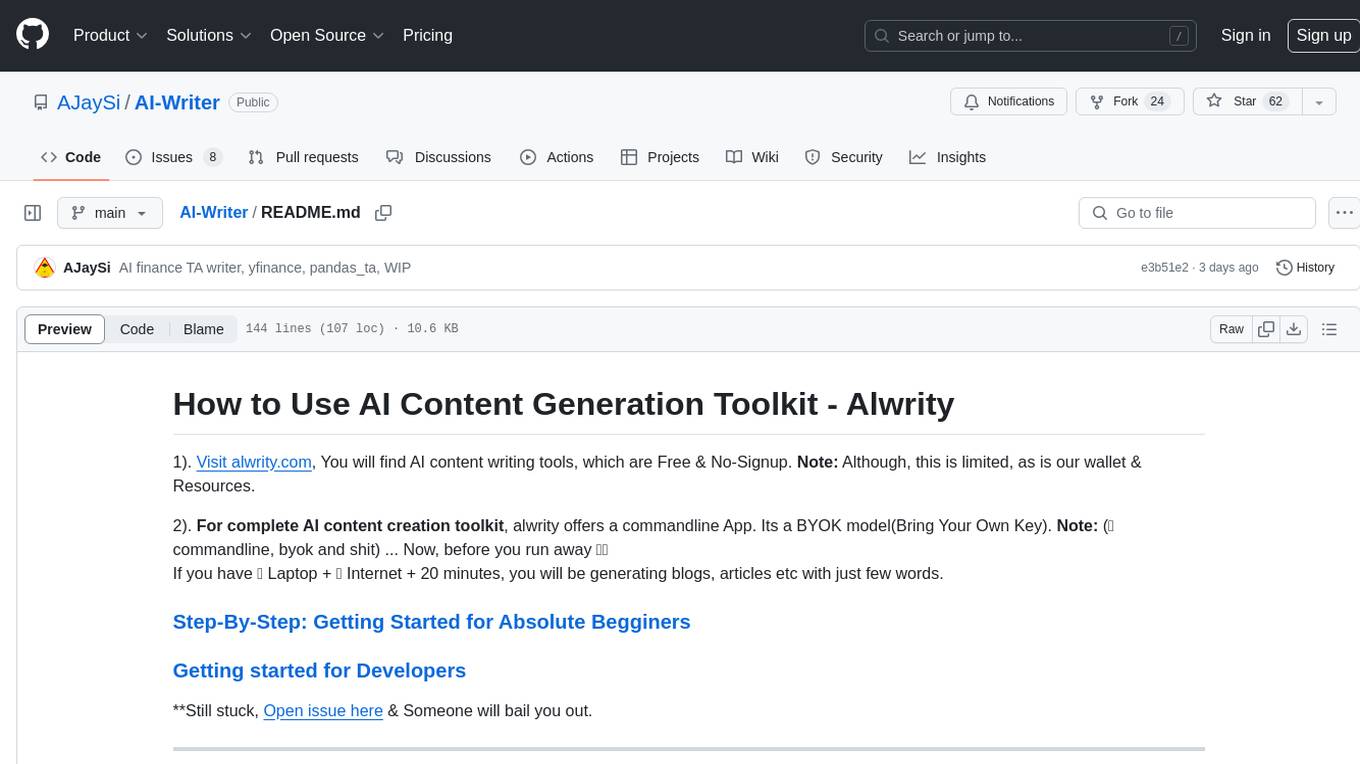
AI-Writer
AI-Writer is an AI content generation toolkit called Alwrity that automates and enhances the process of blog creation, optimization, and management. It integrates advanced AI models for text generation, image creation, and data analysis, offering features such as online research integration, long-form content generation, AI content planning, multilingual support, prevention of AI hallucinations, multimodal content generation, SEO optimization, and integration with platforms like Wordpress and Jekyll. The toolkit is designed for automated blog management and requires appropriate API keys and access credentials for full functionality.
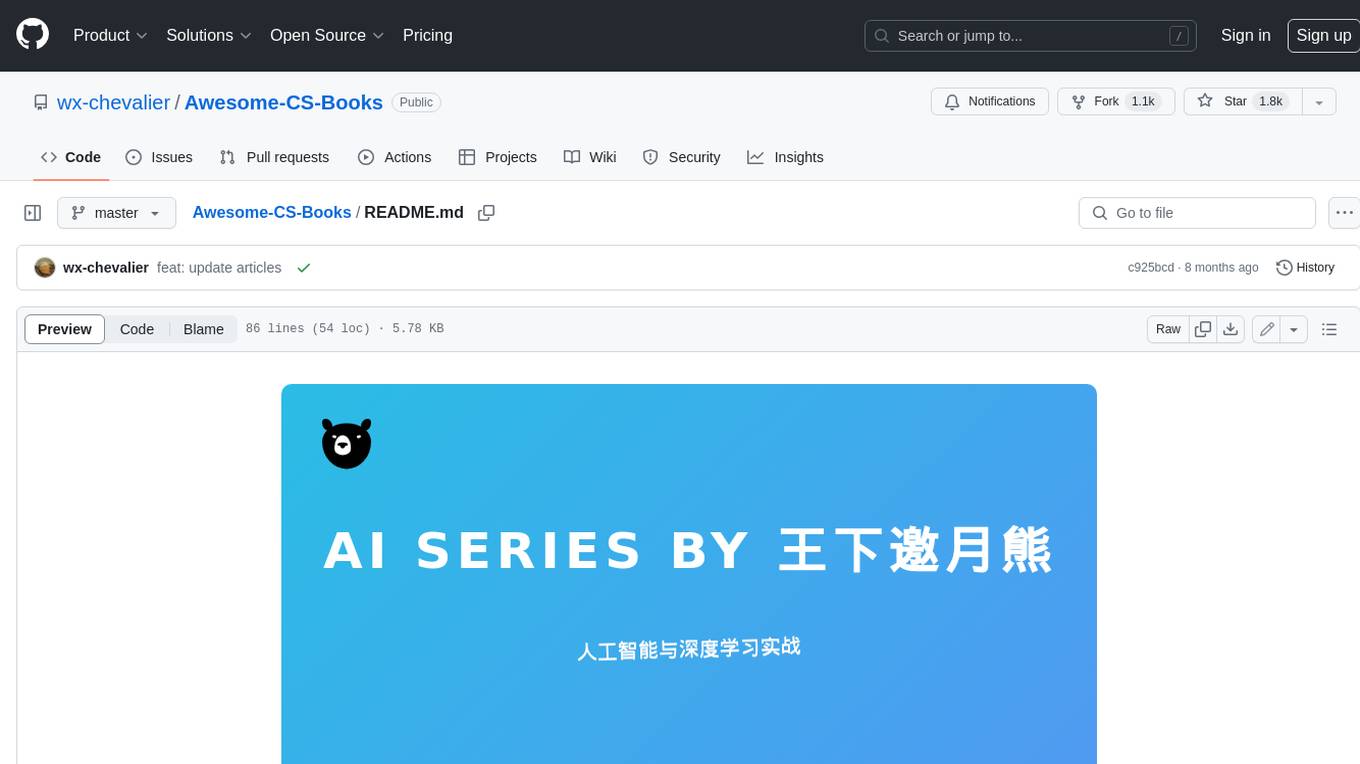
Awesome-CS-Books
Awesome CS Books is a curated list of books on computer science and technology. The books are organized by topic, including programming languages, software engineering, computer networks, operating systems, databases, data structures and algorithms, big data, architecture, and interviews. The books are available in PDF format and can be downloaded for free. The repository also includes links to free online courses and other resources.
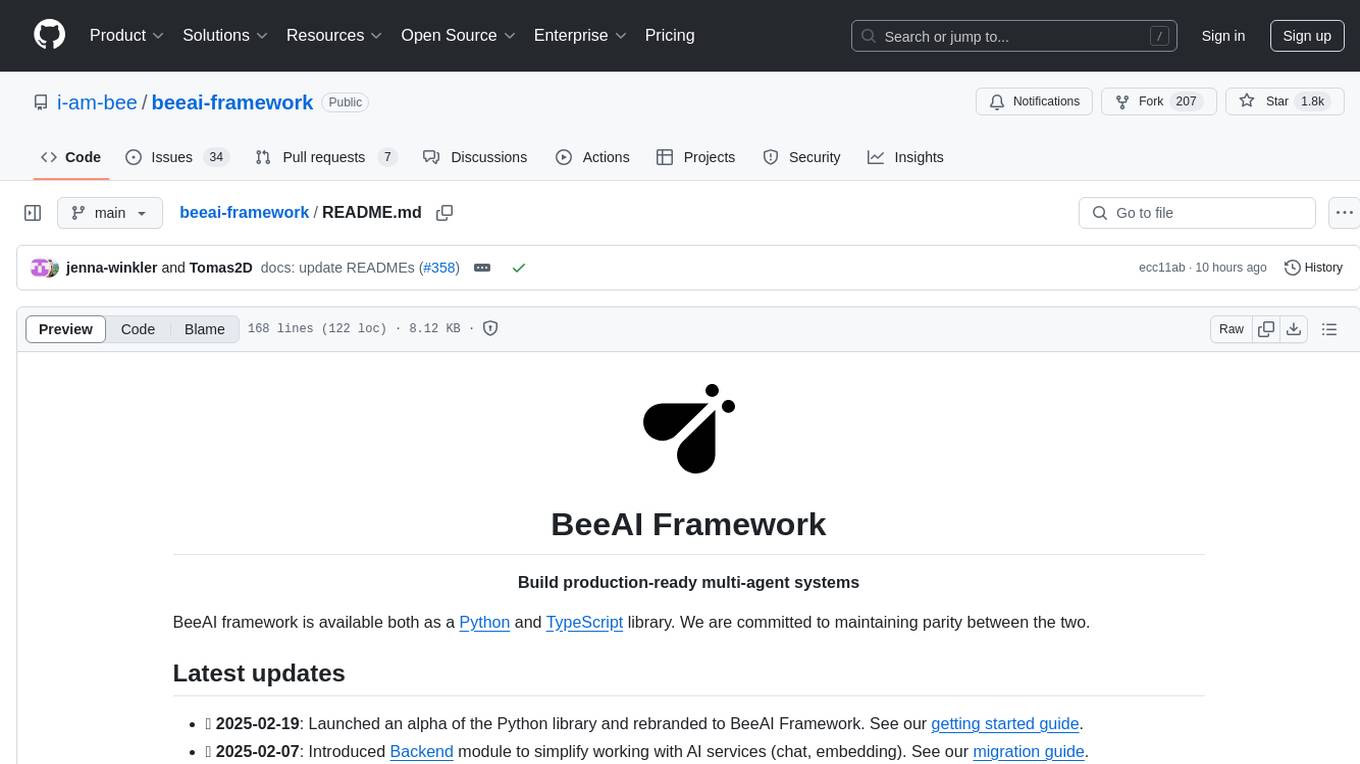
beeai-framework
BeeAI Framework is a versatile tool for building production-ready multi-agent systems. It offers flexibility in orchestrating agents, seamless integration with various models and tools, and production-grade controls for scaling. The framework supports Python and TypeScript libraries, enabling users to implement simple to complex multi-agent patterns, connect with AI services, and optimize token usage and resource management.
For similar tasks

python-weekly
Python Trending Weekly is a curated newsletter by Python猫 that selects the most valuable articles, tutorials, open-source projects, software tools, podcasts, videos, and hot topics from over 250 English and Chinese sources. The newsletter aims to help readers improve their Python skills and increase their income from both professional and side projects. It offers paid subscription options and is available on various platforms like GitHub, WeChat, blogs, email, Telegram, and Twitter. Each issue shares a collection of articles, open-source projects, videos, and books related to Python and technology.
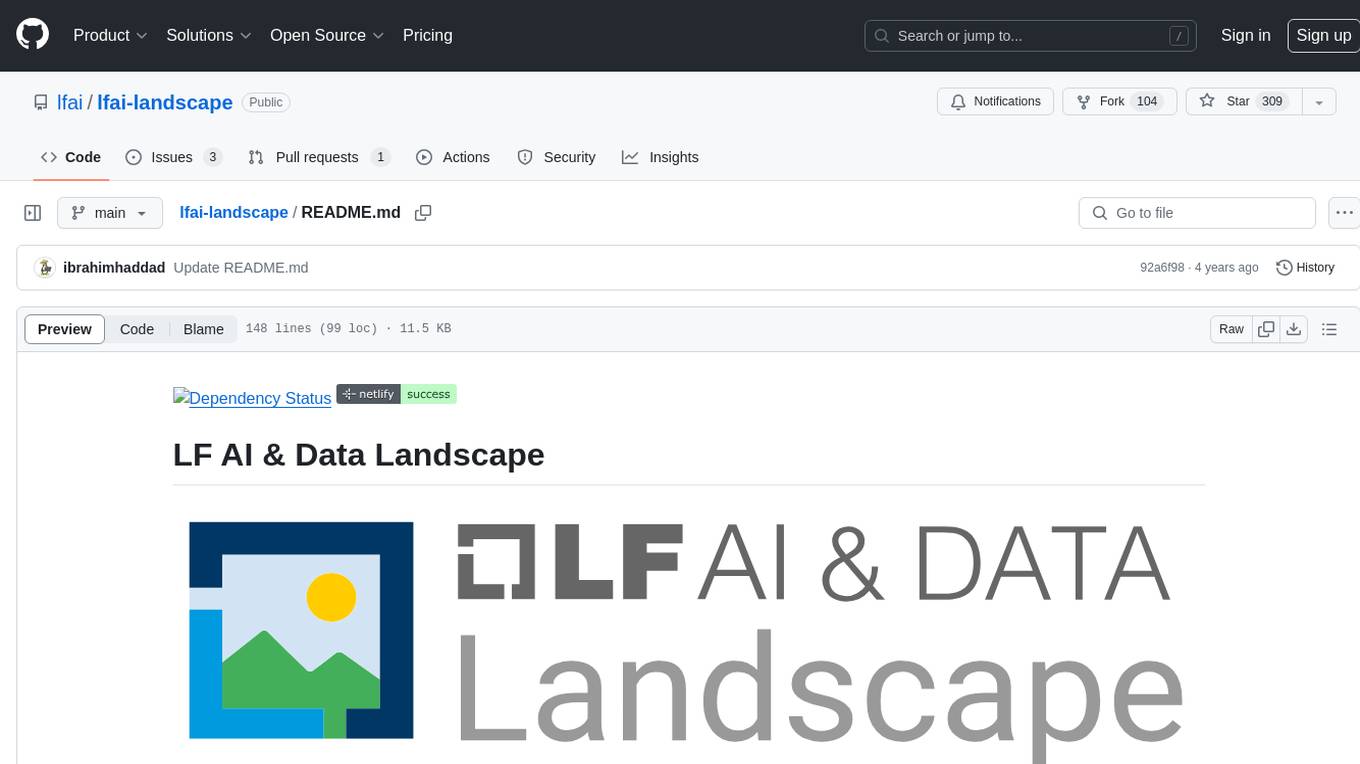
lfai-landscape
LF AI & Data Landscape is a map to explore open source projects in the AI & Data domains, highlighting companies that are members of LF AI & Data. It showcases members of the Foundation and is modelled after the Cloud Native Computing Foundation landscape. The landscape includes current version, interactive version, new entries, logos, proper SVGs, corrections, external data, best practices badge, non-updated items, license, formats, installation, vulnerability reporting, and adjusting the landscape view.
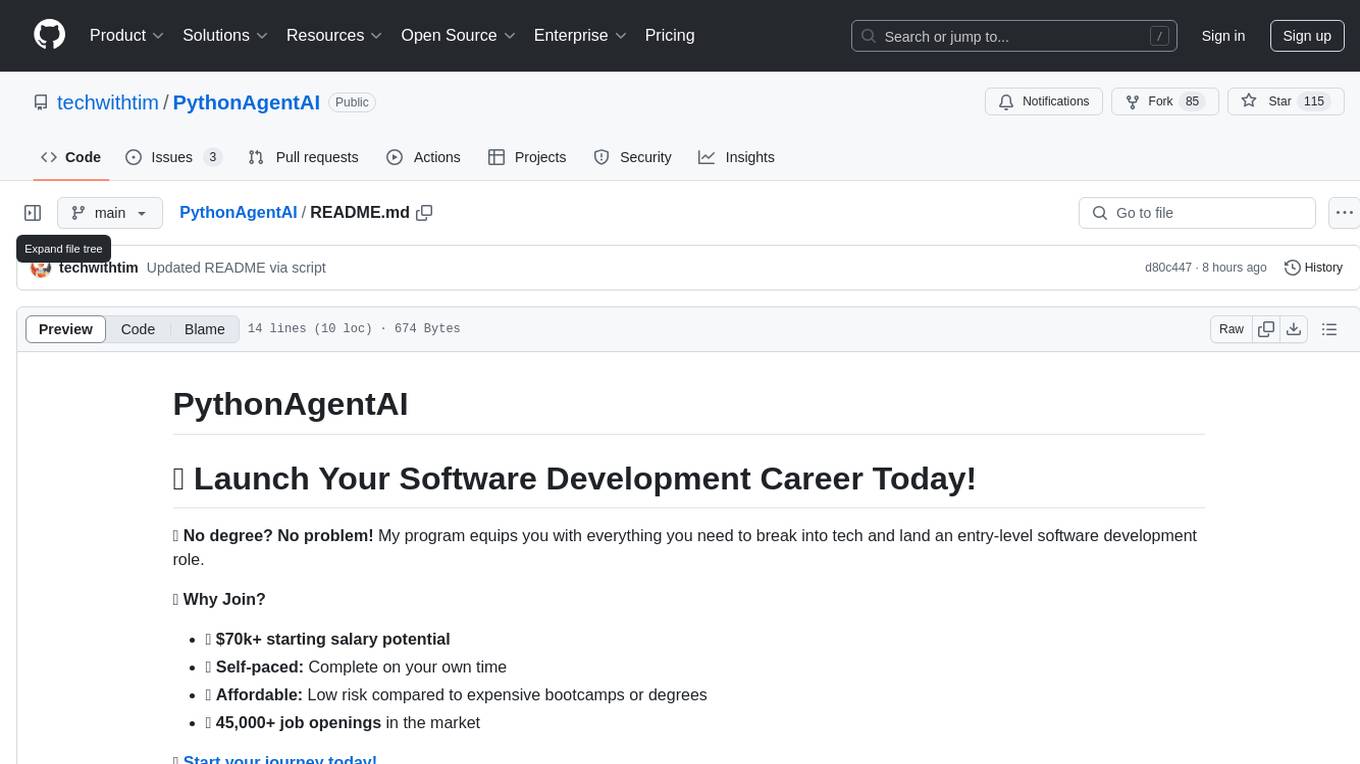
PythonAgentAI
PythonAgentAI is a program designed to help individuals break into the tech industry and land entry-level software development roles. The program offers a self-paced learning experience with the potential for a starting salary of $70k+. It is an affordable alternative to expensive bootcamps or degrees, with a focus on preparing individuals for the 45,000+ job openings in the market. No prior experience is required, making it accessible to anyone determined to future-proof their career and unlock six-figure potential.
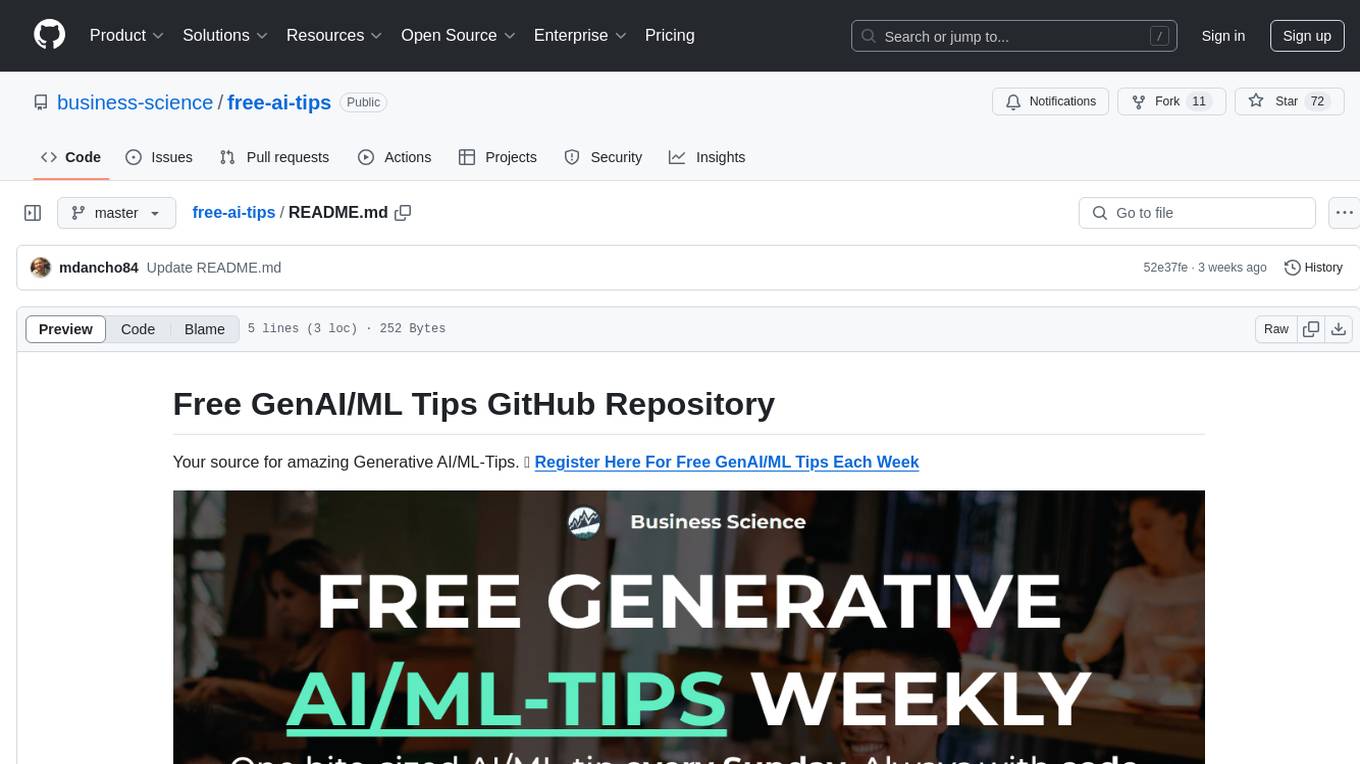
free-ai-tips
Free AI Tips is a GitHub repository that provides weekly tips on Generative AI and Machine Learning. Users can register to receive these tips for free. The repository aims to offer valuable insights and knowledge in the field of AI and ML to help individuals enhance their skills and stay updated with the latest trends and developments.
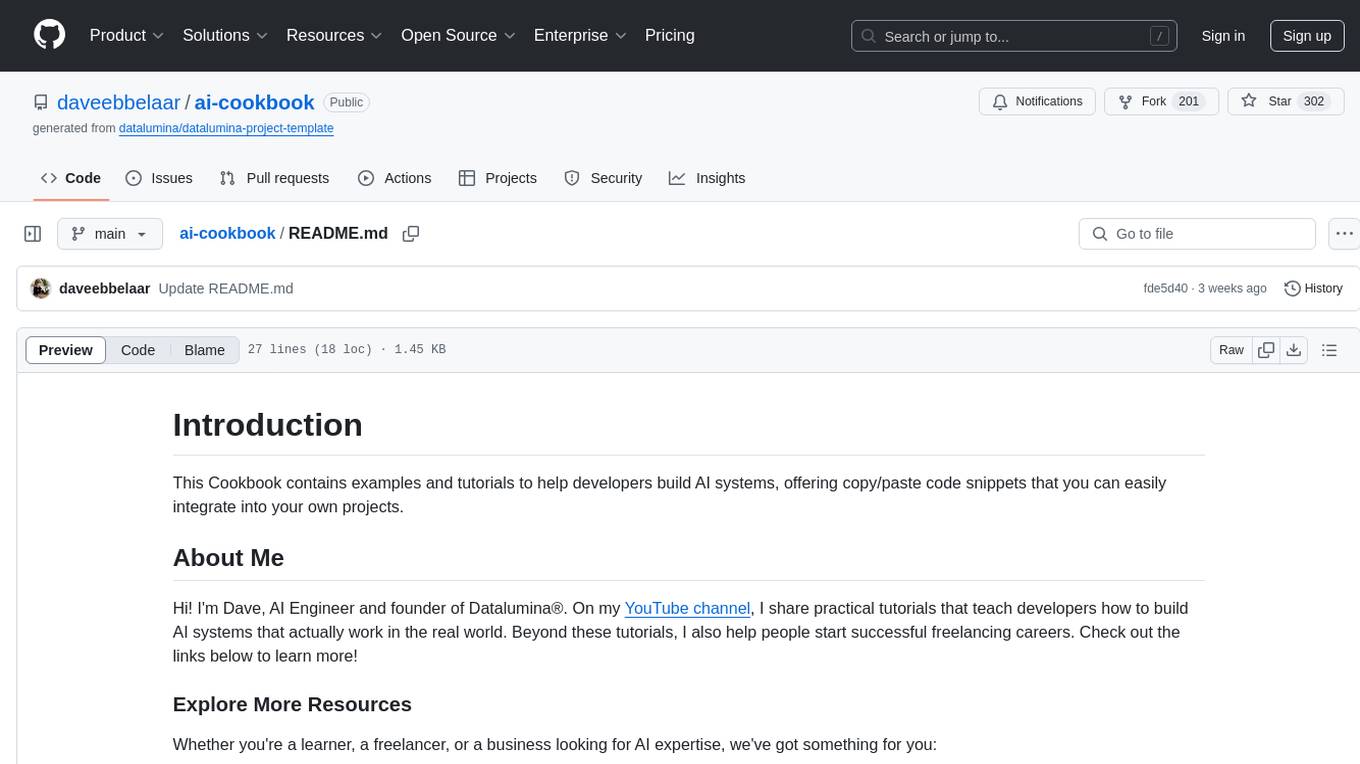
ai-cookbook
The AI Cookbook is a collection of examples and tutorials designed to assist developers in building AI systems. It provides ready-to-use code snippets that can be easily integrated into various projects. The content covers practical guidance on creating AI solutions that are functional in real-world scenarios. The repository aims to support learners, freelancers, and businesses seeking AI expertise by offering valuable resources and insights.
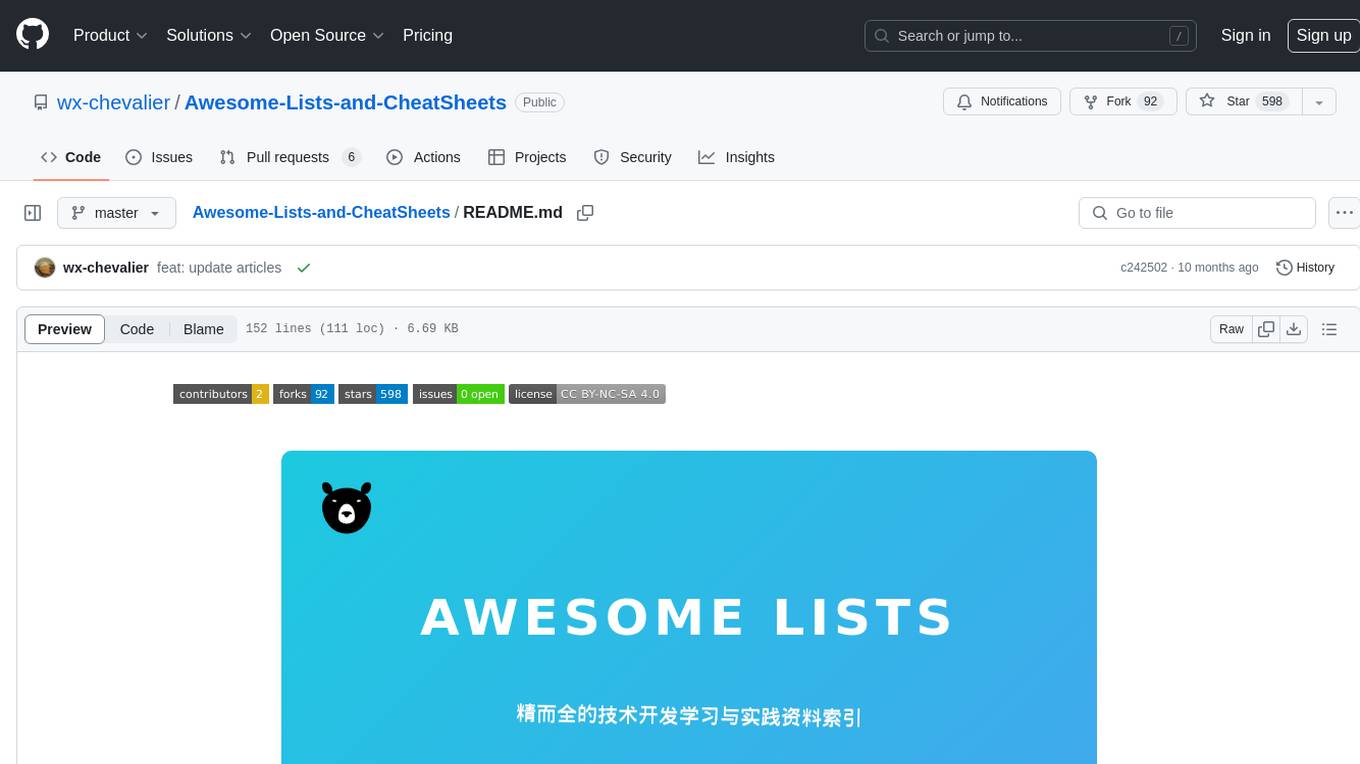
Awesome-Lists-and-CheatSheets
Awesome-Lists is a curated index of selected resources spanning various fields including programming languages and theories, web and frontend development, server-side development and infrastructure, cloud computing and big data, data science and artificial intelligence, product design, etc. It includes articles, books, courses, examples, open-source projects, and more. The repository categorizes resources according to the knowledge system of different domains, aiming to provide valuable and concise material indexes for readers. Users can explore and learn from a wide range of high-quality resources in a systematic way.
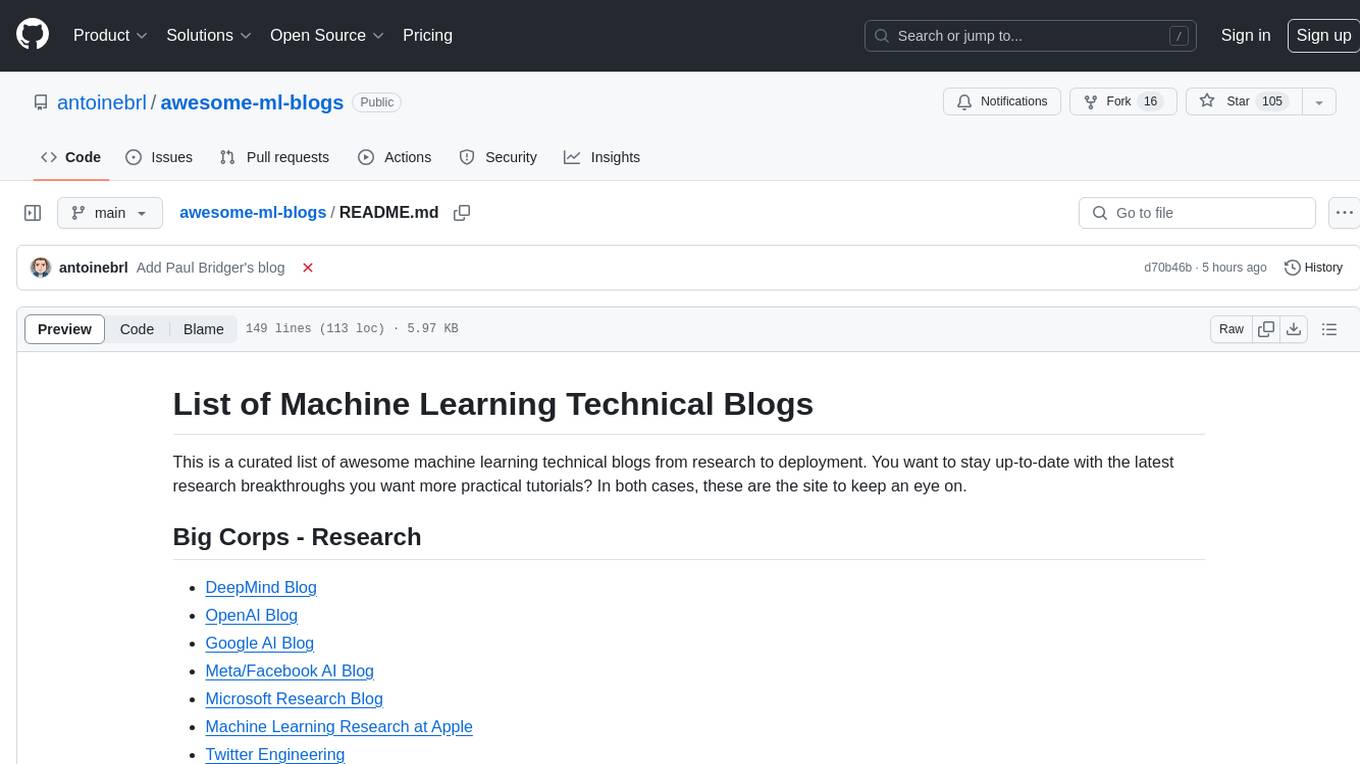
awesome-ml-blogs
awesome-ml-blogs is a curated list of machine learning technical blogs covering a wide range of topics from research to deployment. It includes blogs from big corporations, MLOps startups, data labeling platforms, universities, community content, personal blogs, synthetic data providers, and more. The repository aims to help individuals stay updated with the latest research breakthroughs and practical tutorials in the field of machine learning.
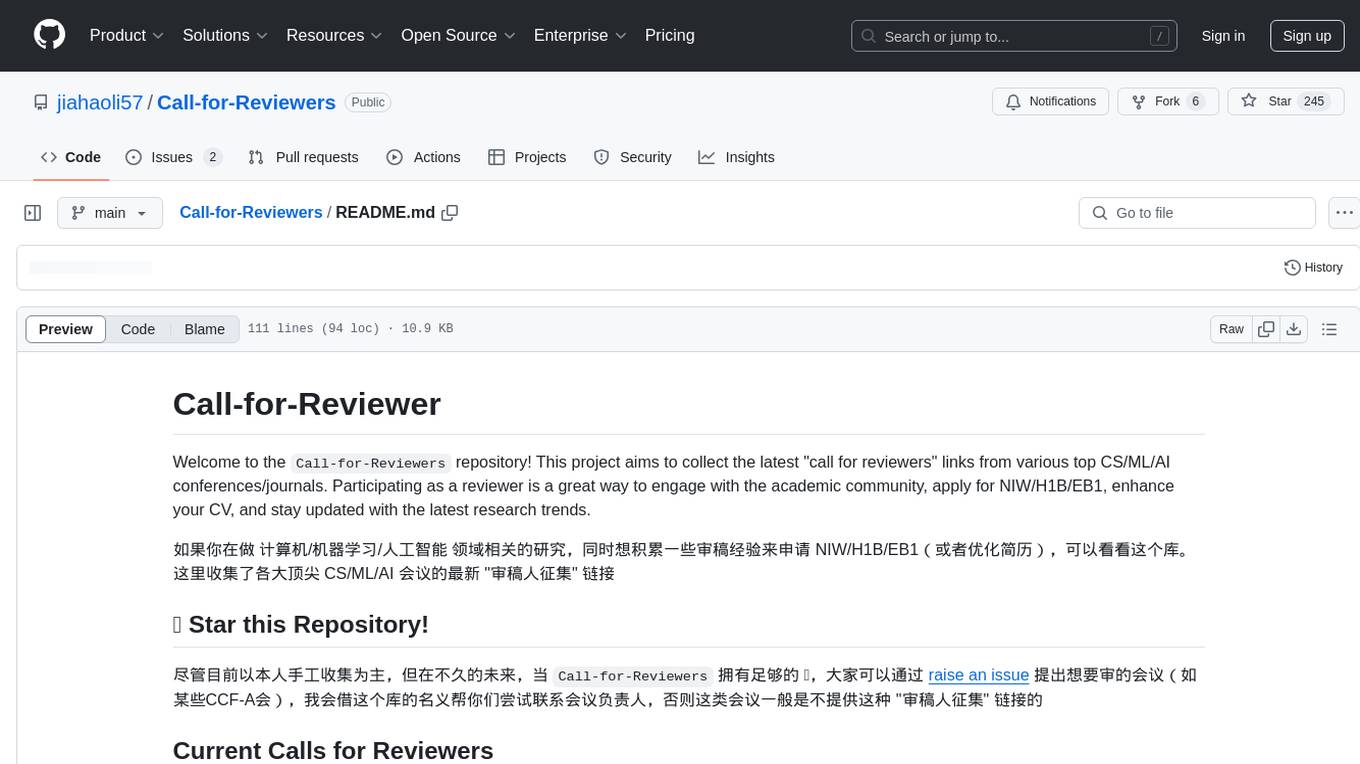
Call-for-Reviewers
The `Call-for-Reviewers` repository aims to collect the latest 'call for reviewers' links from various top CS/ML/AI conferences/journals. It provides an opportunity for individuals in the computer/ machine learning/ artificial intelligence fields to gain review experience for applying for NIW/H1B/EB1 or enhancing their CV. The repository helps users stay updated with the latest research trends and engage with the academic community.
For similar jobs

weave
Weave is a toolkit for developing Generative AI applications, built by Weights & Biases. With Weave, you can log and debug language model inputs, outputs, and traces; build rigorous, apples-to-apples evaluations for language model use cases; and organize all the information generated across the LLM workflow, from experimentation to evaluations to production. Weave aims to bring rigor, best-practices, and composability to the inherently experimental process of developing Generative AI software, without introducing cognitive overhead.

agentcloud
AgentCloud is an open-source platform that enables companies to build and deploy private LLM chat apps, empowering teams to securely interact with their data. It comprises three main components: Agent Backend, Webapp, and Vector Proxy. To run this project locally, clone the repository, install Docker, and start the services. The project is licensed under the GNU Affero General Public License, version 3 only. Contributions and feedback are welcome from the community.

oss-fuzz-gen
This framework generates fuzz targets for real-world `C`/`C++` projects with various Large Language Models (LLM) and benchmarks them via the `OSS-Fuzz` platform. It manages to successfully leverage LLMs to generate valid fuzz targets (which generate non-zero coverage increase) for 160 C/C++ projects. The maximum line coverage increase is 29% from the existing human-written targets.

LLMStack
LLMStack is a no-code platform for building generative AI agents, workflows, and chatbots. It allows users to connect their own data, internal tools, and GPT-powered models without any coding experience. LLMStack can be deployed to the cloud or on-premise and can be accessed via HTTP API or triggered from Slack or Discord.

VisionCraft
The VisionCraft API is a free API for using over 100 different AI models. From images to sound.

kaito
Kaito is an operator that automates the AI/ML inference model deployment in a Kubernetes cluster. It manages large model files using container images, avoids tuning deployment parameters to fit GPU hardware by providing preset configurations, auto-provisions GPU nodes based on model requirements, and hosts large model images in the public Microsoft Container Registry (MCR) if the license allows. Using Kaito, the workflow of onboarding large AI inference models in Kubernetes is largely simplified.

PyRIT
PyRIT is an open access automation framework designed to empower security professionals and ML engineers to red team foundation models and their applications. It automates AI Red Teaming tasks to allow operators to focus on more complicated and time-consuming tasks and can also identify security harms such as misuse (e.g., malware generation, jailbreaking), and privacy harms (e.g., identity theft). The goal is to allow researchers to have a baseline of how well their model and entire inference pipeline is doing against different harm categories and to be able to compare that baseline to future iterations of their model. This allows them to have empirical data on how well their model is doing today, and detect any degradation of performance based on future improvements.

Azure-Analytics-and-AI-Engagement
The Azure-Analytics-and-AI-Engagement repository provides packaged Industry Scenario DREAM Demos with ARM templates (Containing a demo web application, Power BI reports, Synapse resources, AML Notebooks etc.) that can be deployed in a customer’s subscription using the CAPE tool within a matter of few hours. Partners can also deploy DREAM Demos in their own subscriptions using DPoC.




